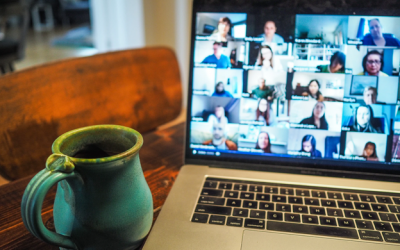
Work hard. Play hard.
It’s something many people adhere to as a life motto – and on the whole it’s a great idea! As the Polish-American film producer, Samuel Goldwyn, said:
“The harder I work, the luckier I get.”
Hard work and a genuine dedication to excel at whatever it is you do very often reap great rewards and means that you can spend your free time being busy doing whatever you wish, usually with a sense of great satisfaction and pride about how you got there.
But sometimes there’s that unwelcome sense of guilt when you’re not working…when you’re in the “me-time” portion of your day or week and…well…it’s getting in the way of playing hard! This nagging sensation can pull us further and further back into work mode, skewing our work:play ratio and before you know it, your work life bleeds into your social or family life. This can be simple things like “oh I’ll just check my work emails to see if that *project with deadline looming* has progressed” or “you guys carry on, I’m just going to make a quick call” that actually take up the whole of Saturday afternoon and means you fall asleep straight after dinner.
On the other hand, there’s also a risk that you become so dedicated to playing hard in your free time, that you start saying ‘yes’ to every social commitment or family gathering offered to you. This can mean that the Saturday schedule starts with a rush to do laundry in the morning because you really have run out of underwear this time, making sure to be on time for a tense brunch at 10 am with your mother-in-law because your partner wants you guys to “bond” or whatever, then a midday coffee date with your friend who is back with her ex and needs to explain to you that “it’s different now”, followed by a quick food shop before a 4 pm Zumba class which your sister has assured you “doesn’t even feel like exercise!”, then at 7 pm there’s a themed dinner with the couple next door where you have to break codes before you actually get anything to eat, and then finally 9 pm drinks with your work colleagues because it’s Dave’s birthday.
Phew!


So there are 2 things to keep an eye on:
1. Work life crossing over into your personal life
2. Your social schedule being just as demanding as work
How can you manage these?
The first step is, as it usually is, awareness. Try to step back and analyse your current work-life balance. If you have a 9-5 during the week, then your weekends should (theoretically) be work free. Are they? Look at the social commitments in your calendar – are they reasonably spaced out? Do you actually want to go? You can even ask friends and family if they have noticed you checking emails or looking into a work-related project when you were spending time with them. Or perhaps you only seem to talk about work (this can just mean you are passionate about your job, which is GREAT, but make sure it’s not because there is nothing else for you to talk about because you haven’t had time to do anything else!)
The second step is adapting your work-life balance if you see any issues. This could be in either direction: it could be the classic situation of too much work and not enough play, but too much play can also be problematic and negatively impact your work life. If your work life is dominating, here are some suggestions for keeping it at bay:
1. Create a work-free space at home – pick a room in your house, for example, the living room, or a certain space, like on the sofa, where you don’t talk about work, where you try your best to not even think about it (this one will take some mindful practice!), and where you cannot see/reach/hear your work phone or email account.
2. Work smarter, not harder – if you find your work is spilling over into your down time because you feel you haven’t been productive enough at work to “justify” not working in the evening (it’s a strange thought process that we’ve probably all had), maybe it’s time to give your approach to work a makeover. If you can feel and be more productive at work that guilt might just fade away. It is also important to note, on the self-care side of things, that your worth and value is not solely based on your output at work.
3. Let people at work know! – It’s important to leave yourself a margin. A zone between “ooh I’m quite stressed” and “right, so, I’m having a total meltdown”. You need a space in between which gives you time to recognise that you are nearing the edge because, with this awareness of how you are feeling, you can then take steps to avoid the total meltdown. This could be taking a day off, leaving all work at the office and logging out of any emails on your phone, delegating smaller tasks, or simply letting your colleagues know that work invading your home life and that you are really stressed out. If people don’t know that you’re working at full capacity…they might give you something extra to do!
If you conclude that perhaps there’s too much play in your work-life balance, then it’s time for the third step…
The third step is accepting that you can’t always say ‘yes’ to friends and family. It’s wonderful to be in a situation where you have so many people that want to spend their free time with fabulous and amazing YOU, but in order to give them quality time with the AWESOME person they love, you need to start saying no to some of the offers! In a world of social media and constant contact with anyone and everyone at the touch of a few screens, it might feel a bit strange, even rude, to say no. You may even want to say yes solely due to the FOMO phenomenon (Fear Of Missing Out). Despite it feeling dissonant to refuse social offers, it is vital that you do because you have got to make time for you. Sometimes you NEED an evening binge watching Friends (even though you know it by heart), taking a long bath or shower, or investing time into your hobby/passion. Make sure you prioritise this recovery space (i.e. a margin) so that you can recharge. Here are some positive ways to say no to social offers:
I’d love to do that in the future, but right now, I’m maxed out from work and I need some time alone to recuperate.
I would love to spend time with you, but I won’t be fully “there” with you – can we try again another time? I’ll message you when I’ve got the brain space!
I really appreciate you asking me, but I can’t tonight, I need to take care of myself and have a quiet evening in.
That sounds great, but I’m super tired and think that could be overwhelming – how about this (then offer a compromise).
Essentially, you can either say yes to everything and do everything poorly (not to mention running your mental, physical, and emotional health to the ground), or you can learn to strategically say no, do a limited number of things well and take care of yourself.
So, remember to be aware of how much you are doing and evaluate to what extent you are coping with all of your work and social commitments (think: everything in moderation!), adapt your work:play ratio if it’s off-balance, and accept that you CAN say no to social events and commitments if you need some quality time alone.
Career success is all about being able to cope with whatever comes your way! Do you want to join the #1 Career Success Club in the UK and Europe? Click here!
Download FREE our 21-Day Career Jumpstart Guide
You Might Also Like
The Future of Wellbeing at Work
Dealing With Toxic Work Environment: 3 Solutions to Help You Feel Better at Work
How to Set LinkedIn for Beginners: The 7 Best LinkedIn Profile Tips
4 Ways to Find (And Keep!) a Remote Job in Today’s Workforce
4 Common Cover Letter Mistakes
4 Best Practices for Building a Top-Notch Team of Remote Freelancers
From Job Seekers to Hiring Managers: Job Interview Tips You Need to Know
Stay Up to Date With The Latest News & Updates
Access Premium Career Advice
Join our Career Success Club today!
Follow Us
Join us on social media and become part of the Career Jump Tribe!






